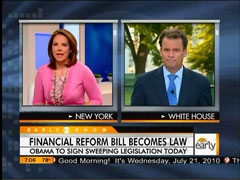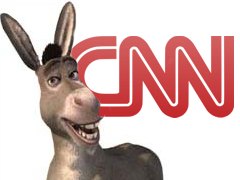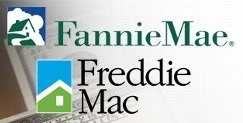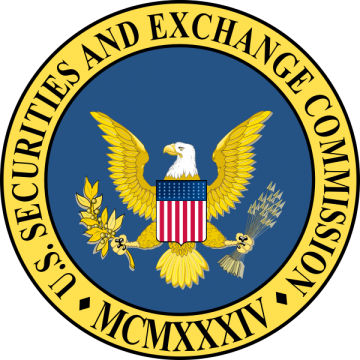On Wednesday’s CBS Early Show, fill-in co-host Erica Hill cheered the passage of financial reform legislation as “another huge milestone for President Obama.” Hill went on to explain: “The first was when he signed the historic health care bill back in March. Today he is set to sign a bill aimed at completely overhauling Wall Street.” White House correspondent Chip Reid began a report on the new bill by proclaiming: “It’s being hailed as the biggest shakeup of Wall Street since the Great Depression.” Reid enthusiastically touted provisions in the legislation: “The bill’s centerpiece is the Bureau of Consumer Financial Protection….charged with regulating financial products, including mortgages, credit cards, and student loans. The legislation also gives broad new powers to the federal government, allowing it to take control of and shut down large financial institutions…” Reid pointed out criticism of the legislation: “But critics say the bill fails to reform mortgage giants Freddie Mac and Fannie Mae, does not create a fund to help shut down big banks when they fail, and gives too much power to federal regulators to create reams of new rules.” After noting GOP concern that bill “will curb growth and kill jobs,” Reid turned to an analyst from the left-leaning Brookings Institution for reassurance: “Still, former investment banker Douglas Elliott believes the bill is better than doing nothing.” Elliott argued: “The bill addresses most of the problems and makes a good start. It’s not perfection, but in the real world, we don’t get perfection.” Reid concluded his report by declaring: “And adding to his accomplishments, later this week the President is expected to sign a bill extending unemployment benefits to millions of Americans.” During a report on the July 15 Evening News , Reid celebrated the financial reform bill as a “big win” for Obama and that “he’ll add it to a long list, headlined by health care reform and the stimulus.” On Tuesday’s Early Show , Reid described the extension of unemployment benefits in similar terms: “Democrats appear to have won a major battle in the long fight to extend unemployment benefits.” Here is a full transcript of the July 21 Early Show segment: 7:00AM TEASE ERICA HILL: Financial reform. President Obama set to sign a bill that will radically alter the way Wall Street does business. But does it go far enough? 7:04AM SEGMENT HILL: It is another huge milestone for President Obama. The first was when he signed the historic health care bill back in March. Today he is set to sign a bill aimed at completely overhauling Wall Street. CBS News chief White House correspondent Chip Reid joins us this morning with more. Chip, good morning. CHIP REID: Well, good morning, Erica. It’s being hailed as the biggest shakeup of Wall Street since the Great Depression. And while this bill does have teeth, some critics say it doesn’t have a big enough bite. [ON-SCREEN HEADLINE: Financial Reform Bill Becomes Law; Obama to Sign Sweeping Legislation Today] The bill’s centerpiece is the Bureau of Consumer Financial Protection that will be housed within the Federal Reserve. It’s charged with regulating financial products, including mortgages, credit cards, and student loans. The legislation also gives broad new powers to the federal government, allowing it to take control of and shut down large financial institutions like Lehman Brothers, which went bankrupt in 2008. President Obama hailed its passage. BARACK OBAMA: Because of this reform, the American people will never again be asked to foot the bill for Wall Street’s mistakes. There will be no more taxpayer-funded bailouts, period. REID: But critics say the bill fails to reform mortgage giants Freddie Mac and Fannie Mae, does not create a fund to help shut down big banks when they fail, and gives too much power to federal regulators to create reams of new rules. Republicans, who almost universally opposed this legislation, argue it will curb growth and kill jobs at a time when the nation can least afford it. JOHN BOEHNER: I think it ought to be repealed. REID: Still, former investment banker Douglas Elliott believes the bill is better than doing nothing. DOUGLAS ELLIOT [FELLOW, BROOKINGS INSTITUTION]: The bill addresses most of the problems and makes a good start. It’s not perfection, but in the real world, we don’t get perfection. REID: And adding to his accomplishments, later this week the President is expected to sign a bill extending unemployment benefits to millions of Americans. Erica. HILL: Chip Reid this morning. Chip, thanks. REID: Joining us now CBS News business and economics correspondent Rebecca Jarvis with a closer look at how these changes could affect you and me, the average consumer, everybody at home. So first up, we know this law is establishing the Bureau of Consumer Financial Protection, that’s going to regulate mortgages, credit cards, student loans. What does it really mean? REBECCA JARVIS: All the things, Erica, that we deal with on a daily basis as consumers are now going to fall under the jurisdiction of this consumer protection bureau. And there are a lot of things that we’ll see as changes in our lives as a result. For example, mortgages, clearly a big problem with the crisis that we faced have been housing prices as well as mortgage crises. And we will see, as consumers, big relief for mortgages. So for example, if you got an adjustable rate mortgage, it used to be that you couldn’t pay it back without paying a big penalty – pay it back early – without paying a big penalty. Now, you will see the relief in that you can save those thousands of dollars in penalties because you can pay it back without – early – without paying the penalty on top of that. Banks now, they are forbidden from giving out bonuses for particular types of mortgages. So, in some cases, back in the crisis, they would give out a mortgage that was bad for us but good for them. They can’t do that anymore. HILL: Because they would make a little extra money off of it. I know credit scores are also going to be effected here. Talk to me about how, because that’s always so confusing. JARVIS: Well, of course, our credit score is the thing that gives us every opportunity in the financial world. The way credit scores will be impacted is that we will be able to learn our credit score. If you go out and apply for a loan, you apply for a credit card, you apply for an apartment, and you get turned down for that, you have every right to ask for a free credit score and to understand the reason that the vendor turned you down. HILL: What a novel concept. You get access to your own information. I love that. There’s also a change about how you pay for things at the register. JARVIS: Yes, there will be some big changes at the register. First of all, you probably are going to have to carry a little more cash on hand if you want to go out and get a cup of java, for example, because merchants, under new regulations, are allowed to set limits on the amount that you can spend with a credit card. So for example, you walk up to the register, they say, no purchases with a credit card under $10, they’re allowed to do that. HILL: Which you actually see a lot of now, or they ask you not to. JARVIS: You do and now it’s legal. HILL: And they also, in some – I’ve noticed in some stores – some stores charge you less, or a gas station, if you pay with cash or a debit card, as opposed to a credit card. That’s going to be more permissible as well. JARVIS: That’s permissible. What is not permissible, Erica, is if they try and say you get a deal for using one credit card over another. You can’t have one credit card be – for example, Amex a better deal than Visa. HILL: Got you. Rebecca, good to have you here, as always. JARVIS: Thanks, Erica. HILL: Thanks for breaking it down.

Read more from the original source:
CBS: Financial Reform ‘Another Huge Milestone For President Obama’






























